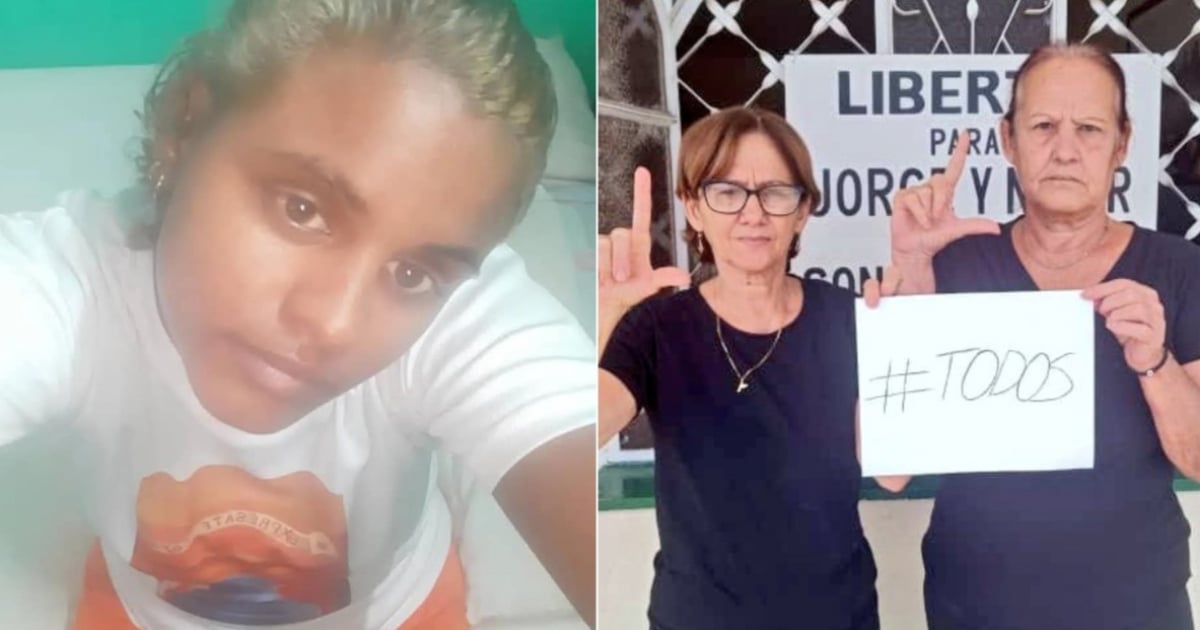The Cuban government released two protesters who participated in the July 11, 2021 (11J) demonstrations on Friday, following a month-long halt in granting parole to political prisoners. This information was confirmed by Justicia 11J and the Cuban Observatory for Human Rights.
Among those released is Yunaiky de la Caridad Linares Rodríguez, who had been serving an eight-year sentence for the alleged crime of sedition. Justicia 11J highlighted that Linares Rodríguez was freed on Friday, February 28, as part of the Cuban regime's promise to extend parole to 553 prisoners with various sentences.
Linares Rodríguez, a political prisoner, suffered from thyroid issues and repeatedly reported not receiving the necessary medication while incarcerated. She also endured punishment cells for demanding respect for her rights, leading her to self-harm out of despair and distress.
Another individual released is Andy Alexis Martín Pérez, who gained his freedom on Thursday, February 27. Both are part of a group of political prisoners whose cases have been closely monitored by human rights organizations.
Conditional Releases and Continued Control
The recent releases do not equate to a full pardon. Maricela Sosa Ravelo, Vice President of Cuba's Supreme Court, stated in January that these steps "are neither an amnesty nor a pardon" but rather parole benefits contingent upon "good behavior."
This implies that the individuals released could be re-incarcerated if authorities deem it necessary. So far, at least six releases have occurred in the past 48 hours since the process resumed after a month-long suspension. Justicia 11J noted that the release of political prisoners is happening in the context of negotiations with the international community.
Previous Releases and Political Context
In January, the Cuban authorities announced the release of 553 prisoners convicted of various crimes, without specifying how many were political detainees. However, following the U.S. administration's decision to include Cuba on the list of State Sponsors of Terrorism, the release process was temporarily halted for several weeks.
Names such as Iván Mauricio Arocha Arocha, Brusnelvis Adrián Cabrera Gutiérrez, Ohaurys Rondón Rivero, and Yaquelin Castillo García have also been included in the recent releases. All were detained following the 11J protests and have now been granted conditional freedom.
The Cuban Observatory for Human Rights warns that these releases "do not signify an improvement in the human rights situation in Cuba," as those freed remain under strict state surveillance and face the threat of re-imprisonment at any moment.
Meanwhile, human rights organizations continue to denounce the existence of hundreds of political prisoners in Cuba and demand their unconditional release.
Insights on Recent Political Prisoner Releases in Cuba
What prompted the Cuban government to release political prisoners after a month-long pause?
The Cuban government resumed political prisoner releases after halting the process for over a month, likely due to international pressure and negotiations with global entities advocating for human rights.
Are the released prisoners completely free from their sentences?
No, the released prisoners are not entirely free from their sentences. The releases are conditional and based on perceived good behavior, with the possibility of re-incarceration if authorities decide.
How does the Cuban Observatory for Human Rights view these releases?
The Cuban Observatory for Human Rights considers these releases as insufficient improvements in Cuba's human rights situation, given the continued surveillance and potential for re-arrest faced by those released.
